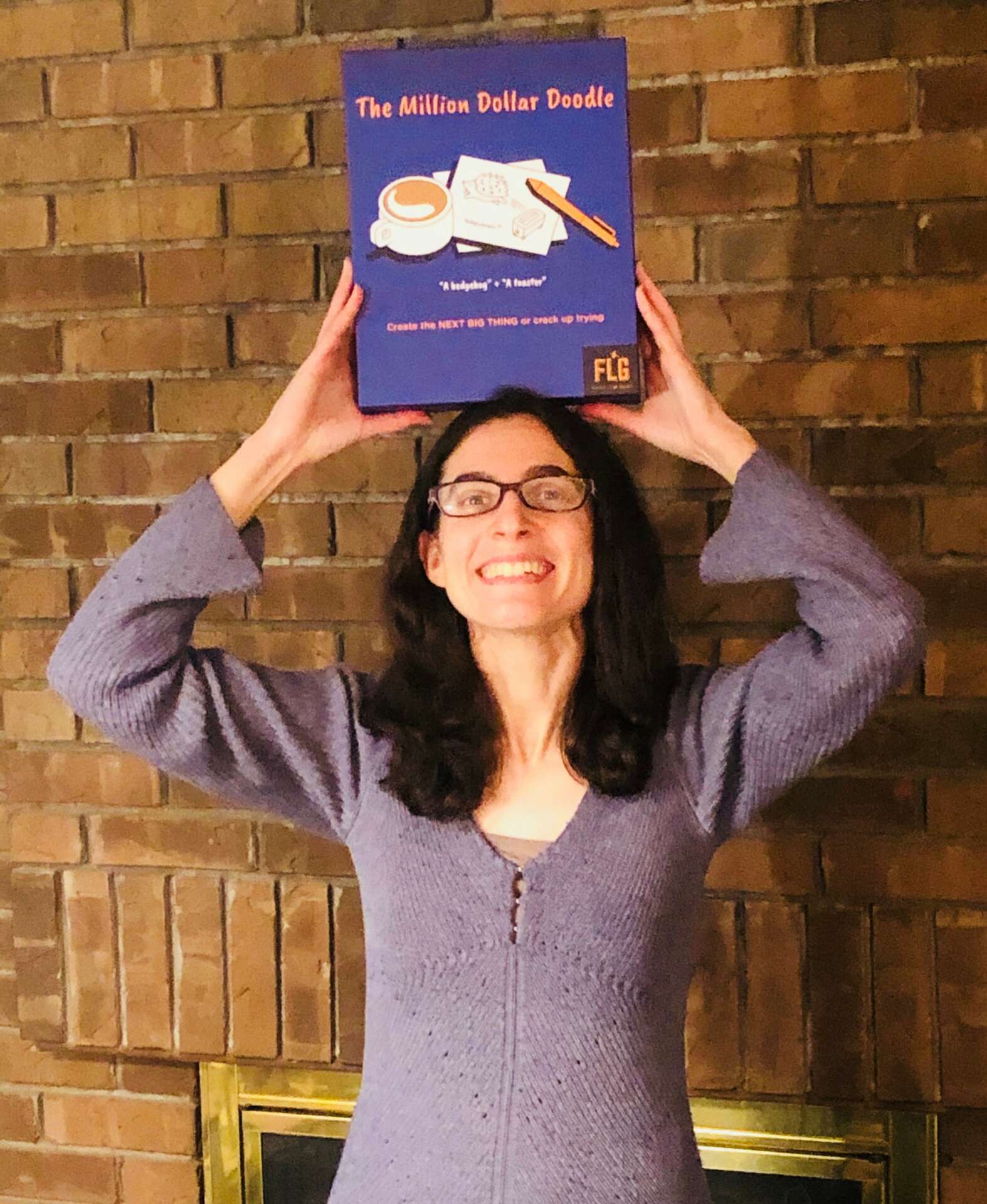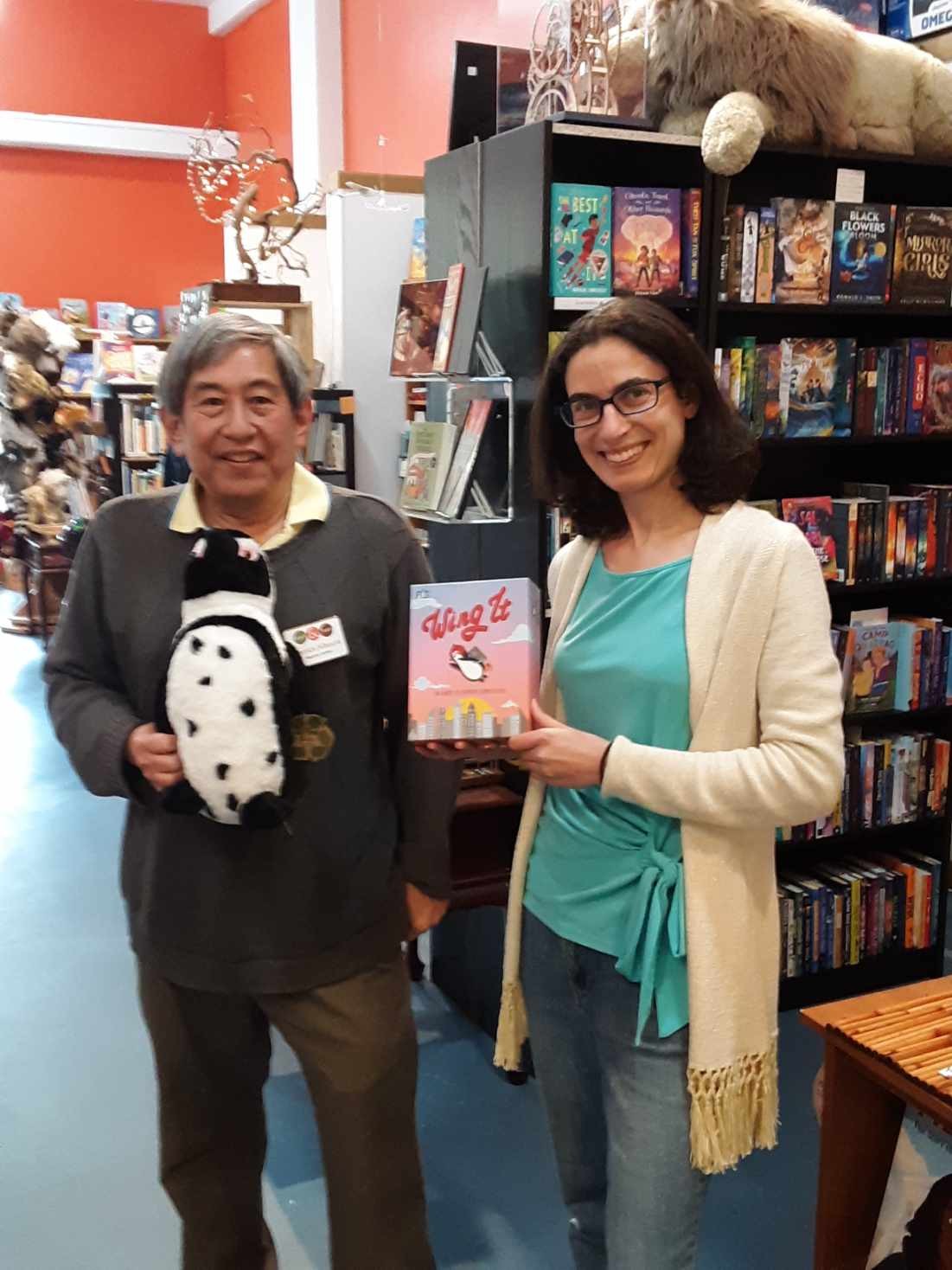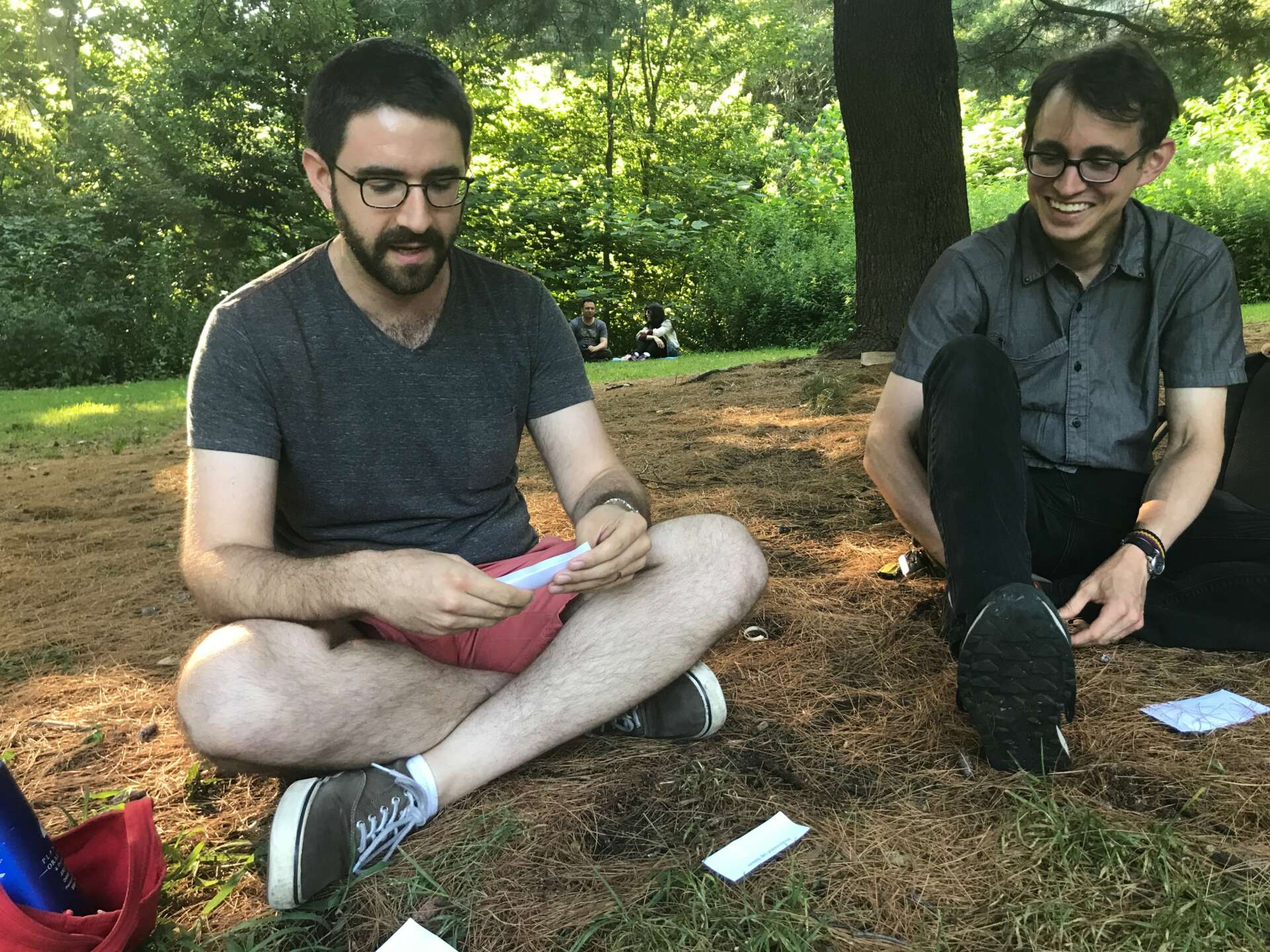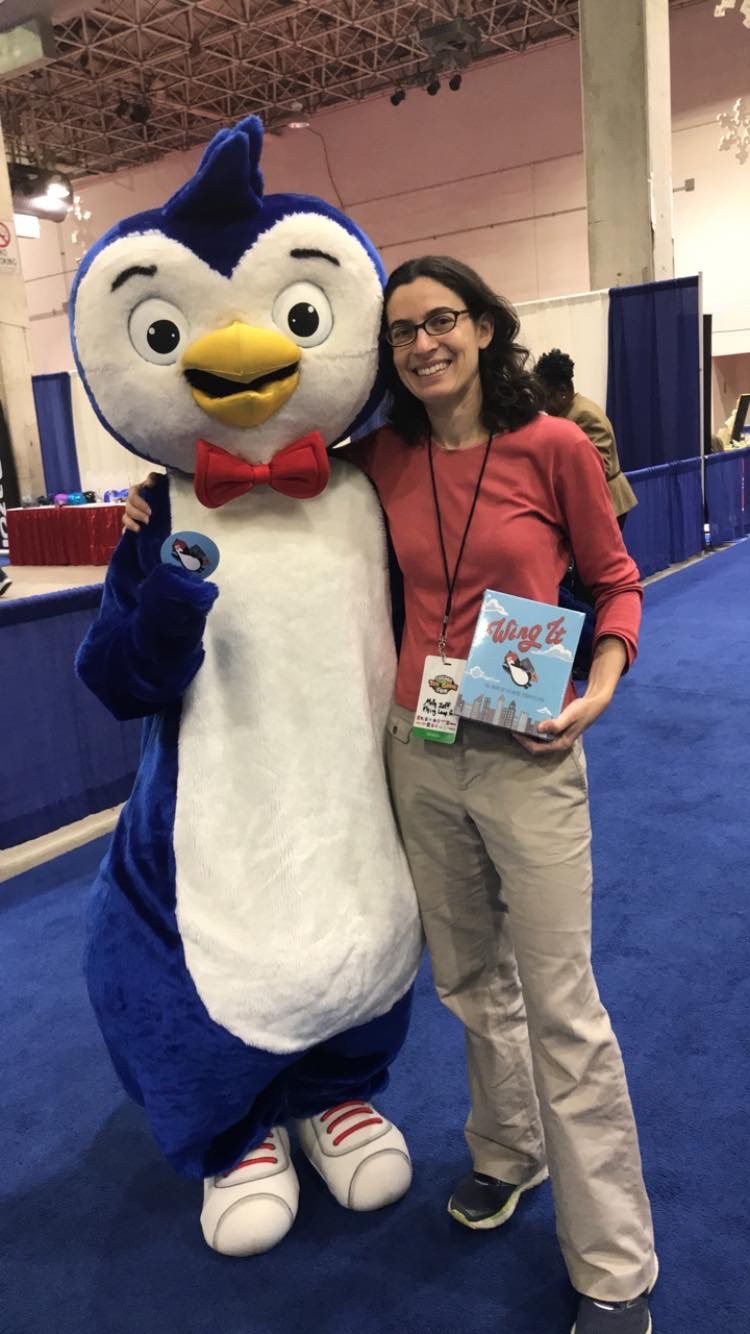We’re excited to introduce you to the always interesting and insightful Molly Zeff. We hope you’ll enjoy our conversation with Molly below.
Molly, thanks for joining us, excited to have you contributing your stories and insights. One of the things we most admire about small businesses is their ability to diverge from the corporate/industry standard. Is there something that you or your brand do that differs from the industry standard? We’d love to hear about it as well as any stories you might have that illustrate how or why this difference matters.
There are at least 3 key ways my game company takes “the road less taken” when it comes to industry standards. First, I engage in an unusually personal and often literally IN person approach in terms of my relationships with retailers. I’m primarily referring to the fact that I have traveled the country in the US, Canada, and the UK for years now visiting new and current indie game and toy stores, spending time with literally hundreds of staff, managers, and owners at stores and sharing the games I make with them. While I obviously show my games when I go, I also often get to know my retailer partners more deeply, whether by chatting about their stores, getting to know them a bit, sometimes meeting their families, and occasionally holding game nights. I may only spend 15 or 20 minutes at a store but often times we end up talking for nearly an hour or more. At this point, I have visited over 300 stores, and I’ve gone back to many places 2, 3 or even more times in some cities. Building these kinds of relationships takes away the infamous “cold call” part of sales, but most importantly, it’s also extremely fun (if exhausting) and I’ve grown to truly respect and adore so many of the retailers I work with and even call many my friends. They often share the same drive for community building that I do and it’s one reason many of us enjoy being in games, to create communal spaces where customers deeply connect and laugh together. I acted for over 14 years, and I like to think of my whole approach with partners as “breaking the 4th wall.” In theater this means directly talking to the audience as yourself, and I like to do that in life: be willing to show people who you really are means taking off the mask we so often wear in life, and when you let down barriers, other people do, too.
Secondly, the games I make, while sometimes similar to other party games/casual games out there, differ from a fairly strong norm within my genre of game. Many party games do all the work for you; the joke is on the cards themselves, the “answer” to the judge’s prompt is, well, already written on cards, so you just choose your best, funniest card and… that’s that. And one complaint I’ve heard is that the same cards always win, as in “in Cards Against Humanity, the d&*% joke always wins. In the games I’ve made along with ~20 other designers/game developers… that won’t happen. There is infinite “replayability” in that no two rounds of a game involving some kind of “pitch” from a player will EVER be the same. Everyone will come up with a different answer even if they DID get the same hand of cards, which itself is unlikely. Our games don’t JUST have hilarious cards — though they do — but they ALSO bring out the creativity in players and give people the tools to be funny and silly and make each other laugh through their original, (often VERY strange) stories or pitches. In our bestselling Wing It: The Game of Extreme Storytelling, for instance, all players receive the same funny, quirky situation card, but then everyone has a hand of 5 Resources they pick 3 of to tell a story about how they’ll get out of a situation. So, each player may be winning back the love of their life at a casino with… A snobby orangutan, all ingredients for s’mores, the fountain of youth, the beating heart of a happy cow, and an entire set of Hitchcock films. You can imagine how crazy the stories can become!
Another way I’ve differed from industry standards is in my efforts to improve diversity in the board game industry. Back in 2020, a bunch of us involve in GAMA (Game Manufacturers Association), our trade organization, saw that there was a serious problem and decided to do something about it.
Just weeks before the game convention that GAMA was planning in 2020, Origins Game Fair, a number of Black speakers and allies dropped out of Origins due to lack of explicit and early support for Black Lives Matter from the organization behind the convention. The convention was canceled as a result. A group of GAMA members, including myself, decided to form a DEI team, and over the months of meeting, one issue we flagged is that the game industry needed more diversity. It has historically been mostly white and male and most companies are led by white men. We wanted more people from underrepresented backgrounds to make our industry more inclusive and create more diverse games and more diverse customer bases at stores and so on.
To take on the problem, a sub group of us formed a team to cofound the Horizons Fellowship and Rising Stars Programs, which increase industry diversity by bringing in more people from diverse backgrounds as far as gender, sexuality, religion, race and ethnicity, and ability. We will soon enter our third year running the Fellowship. How is this different than the “industry standard” as far as efforts to improve diversity, you might ask?
Well, I’ve noticed some people see a problem as big as lack of diversity and discuss it; others vent; others use their voice and speak up; others use their “feet” and walk away… ie they disengage from the event or organization they see as a problem. Many others I’ve seen and respect do one on one mentorship to lift people up. What I and a few others (4 folks from 3 other companies) did was look at the big picture and say, how can we improve the whole industry? How can we create a longterm way to bring more diverse voices, companies and games to the proverbial table? How can we shift from there being a strong “Old Boys Club” to an “everyone” club? That is what I, through partnership with a tiny group of others with the same mindset, and through endless hours of volunteering for 3 years, decided to do: to work on building a more inclusive industry by founding a Fellowship. We offer an accelerator program of 7-8 months coaching, mentorship, and a free ride to the annual trade show. We gave up time to grow our own companies and instead focused on making small but important changes to the industry as a whole. While this isn’t donating thousands to diversity efforts (though one company involved does that, too!), we are opening up pathways for more diverse creators and store owners to get their games out there in the world of indie gaming, which in turn impacts the endless thousands of people who enjoy games and game stores.

Awesome – so before we get into the rest of our questions, can you briefly introduce yourself to our readers.
I decided back in 2010 I wanted to be weird for a living and I wasn’t really getting to use one of my greatest assets — being weird and creative — at work. So I began making games. I had spent 7.5 years in social businesses/nonprofits on market based solutions to poverty, and I loved that career, but I also wanted to do something weird and silly and fun!
Ok, that’s the simple version. Here’s the other (though no less or more true!) version: in 2010 I had JUST started a new job I loved at a fair trade food and beverage company but I knew I wanted to go back to business school in 3-5 years, and I knew it was going to cost a TON of money. So, I decided I needed to write a book or invent something and sell a MILLION copies.
At first I began writing a book on how to fail well, since failing and moving on is something I’m good at, but then I decided I hadn’t failed enough… and, inspired by the book Would You Rather, and the idea that people were paid to write those crazy questions and paid to sit and be weird all day… I decided to create a game involving getting into absurd, crazy, funny situations where people would use resources to get out of the problematic situations. I called my friend Jon about making the first game together, and Wing It was born. This childhood friend Jon (who’s been a friend now for 28 years!) and I began making games together and even after he left, I’ve continued making them with many other partners. The company we ultimately incorporated in 2017 makes a line of creative, hilarious, unusual party games that bring out the creativity in our customers, build community among players, and deepen relationships. This isn’t just a line; we hear this from all different kinds of customers about what our games did for them or their families.
For example, some families have played Wing It on a car trip for HOURS and wrote to say how much fun they had. One grandma who played Wing It with her kids and teenage grandkids said it should “come with a Pampers warning” (because they were laughing so hard). Our designer for that game, Yuliya Kim, who’s an Uzbekistani Korean American refugee, wrote to share the following story in our early years:
“This is so touching… my cousin who came to the states a couple years ago took Wing It to his Conversation Club (which is a group for international students at his community college) and they played the game for hours! He said that it was so much fun that even when they were kicked out of the room, they went somewhere else to play the game somewhere else”
“And he said that it was his first time getting really close to people and making friends”
We also have heard of kids and adults with autism being helped through game play. I would say I’m MOST proud of how many amazing, hilarious memories we have helped create for our customers through our games and how many people’s lives we’ve touched with our games in so many ways. Those kinds of stories from customers make all the hard parts of being a full time entrepreneur worthwhile.
More recently, through our game How to Lose a Guy in One DM, the first 18+ game, we’ve highlighted awful behavior on dating apps and many REAL lines by REAL men. The game offers catharsis for anyone (especially women) who has dealt with the WORST behaviors in online dating. In this way, my company know highlights an actual, real problem of ridiculous and inappropriate behaviors in dating, so maybe we’ll even get some people to start behaving better!

Alright – let’s talk about marketing or sales – do you have any fun stories about a risk you’ve taken or something else exciting on the sales and marketing side?
Back in March 2018, our first game was in 11 stores in 4 states. The savings I had from prior jobs and selling my car were dwindling. When I went to a trade show in Reno that March, having never been to either a trade show OR even gaming convention before… I had only rent plus $25 in my bank account because I had used just about all my savings. I was so broke that I badly needed to sell more games to continue being full time in my game company, which my cofounder and I had just incorporated in 2017. Little did I know, what happened in Reno would change life for me and my company forever…
The trip started out with some bad luck: A flight delay resulted in me missing the first night of networking, and I ended up at my hostel after midnight that night having missed what seemed to be the only major networking event of the week. But rather than just heading to my hostel the following night, on that Monday, I looked at retailers’ schedules and saw they were all gathered at a bar within the hotel/resort where most industry folks were staying, so I set out to meet them. I only knew my St. Louis retailers when I walked in, so we went up together… me with a grocery bag since I had just walked all the way back from a store over 2 miles away! I walked into that bar with my groceries and few connections, and that single night changed the course of our company entirely. Armed with a copy of Wing It, I struck up a conversation with a group of retailers in a cute inlet of the bar whom I had never met (remember, I knew only a handful of people at the trade show). As it happened, I met the “right” people at the right time because it turned out that the group of retailers I joined was part of a network of deeply connected individuals who are all among some of the most successful indie retailers in the US, Canada, the UK (and with one member even in Australia!).
After chatting with Matt – a retail store owner from Vancouver, WA – he basically said, “Why don’t I look at Wing It while you eat your cheese?” (a grocery store purchase). After briefly examining the game, Matt asked, “Are you on Paypal? I’d Paypal you for ten of these. I could sell five of these tomorrow. I could sell five right now.” Well, considering that an order of ten games was a large order for the company at that point, this was an exciting moment. He believed in our game already! Matt got everyone’s attention and the group played a round of Wing It. He led the whole thing.
This was followed with more rounds of playing and free-flowing advice; calling over distributors, who are helpful for getting games into stores; and even pulling one retailer out of bed to come check out Wing It! [That particular retailer, Andrew Zorowitz, has become a regular advisor to the business and is still a friend years later]. The group had to leave the bar for a lobby at midnight (closing time) and then we kept at it until 2:15 a.m., with nearly 4 hours of playing and me getting solid advice. Unbeknownst to me, Matt went on to tell other retailers on Facebook about that night and our game. It was only after a retailer I had never met, John Stephens, told me the next morning at the convention, “You’re the one with the cheese. I know you; I’m going to buy your game,” that I realized what a fortuitous decision my trip to that bar turned out to be. People began ordering at the show and from around the country.
Due to these new connections from the GAMA trade show, Wing It began selling across the US, grew from about 11 to around 60 stores, and sold (nearly) every day for four weeks straight. Then an Australian distributor bought 275 copies and we ran out of stock. We had an order for 48 games by a store and couldn’t fulfill it. We had to reorder months sooner than we might have predicted. And that was all due to one night at a bar and some cheese.
Retailers later told me congrats on having one of the biggest successes of the GAMA trade show! I also heard that they liked my authenticity. I just sat on the floor of the bar and ate my cheese (ha. That’s just who I am), took advice, and that they liked how I was ready to listen. Apparently other publishers have been reticent to take advice. What I learned is that it was an asset to be exactly the weird person I was in my new industry, and that it is well, perfectly acceptable to eat my own cheese at a bar!

How about pivoting – can you share the story of a time you’ve had to pivot?
This is both a story of resilience, a time I needed to pivot, AND a great sales story when I learned an incredibly valuable lesson that led to how I’ve done business for YEARS, actually. Here’s the set up of the story:
November 2018 was an odd time. On the one hand, the second print run of Wing It had FINALLY come in that September, months after we had reordered in spring 2018 after the first print run sold out quickly. True, we had taken on debt to reprint, but I had a source of income again from it that was paying my rent in Brooklyn, NY. On the OTHER hand, almost no orders had come in that November! See, after most of the first print run sold directly to retailers in spring 2018, we had a ton of backorders from distributors that our shipping company fulfilled later in fall 2018, but these distributors didn’t seem to need any reorders. Almost no money was coming in, and by sometime in mid December I realized I didn’t know how I was going to make rent in January. I was in a bind, and I believe that’s often when innovation happens.
This time, I innovated by necessity and also partly by accident. At first I was planning to call my friend Nick to ask, how can I make $1000 in a week? He was ALSO an an entrepreneur and might have ideas. $1000 was at least close to my $1150 rent. But… something else great happened instead. It all started when my friend Jake asked me where to buy Wing It locally in Boston for his girlfriend (now wife) as a gift, I told him some options, including Porter Square Books in Cambridge, MA, so he went the next day, bought it, and then gave me the insider scoop, saying he bought the last one and I should see if they would want to reorder! This was the Monday 8 days before Xmas and less than a WEEK before the biggest shopping weekend of the year, so I needed to restock them QUICKLY. I called the store that very day, didn’t reach the buyer, emailed her instead, and then heard back at around 6:15 the next morning that yes, she’d like more. (So maybe other stores did, too…)
That’s when the lightbulb came on. I figured other stores might want to restock, so that Tuesday, I spend about 7.5 hours coworking at a friend’s place and calling at least 14 stores. I offered all of them free 2-3 day shipping so they could get more games in time. (Because hey, paying that shipping for them was “January’s problem” as I like to say). One store that had only had 6 Wing It originally wanted 18 (wow!). And at least 7 stores ordered overall, nearly all from my calls, only one on their own. THAT was a big moment in my growth. In making calls for just one day, I had made up my rent and THEN some. But in the bigger picture, the point was that I had learned one of THE most important lessons in this industry:
Stores may run out of your game and the buyers may want more, but even if your product is a bestseller (yep, even THEN), an owner/mananger often won’t think to reorder. You’ve got to remind them. See, they could be carrying thousands of SKUs, ie individual products, so the idea that they will remember to reorder one particular product you make, especially during the busy season, is unlikely.
As a board game entrepreneur, you’ve got to understand this point to do sales well. I was learning that if I wanted to sell, I needed to pick up the phone and make a personal connection and just do it, not wait around for orders to come in. Calls to retailers I work with directly remain a MAJOR part of how I connect with people. That personal touch is a main way to not only restock or educate about new games, it’s also how I figure out the word on street about which games are or aren’t doing well. Given that I often hear retailers are overloaded with emails, I suspect that’s why a personal touch and quick phone call makes all the difference.

Contact Info:
- Website: https://flyingleapgames.com
- Instagram: https://www.instagram.com/flyingleapgames/
- Facebook: https://www.facebook.com/flyingleapgamesllc
- Linkedin: https://www.linkedin.com/in/molly-zeff-ab71527/
- Twitter: https://twitter.com/GamesLeap
- Youtube: https://www.youtube.com/watch?v=_1sgujDYSqo
- Other: Tiktok: https://www.tiktok.com/@flyingleapgames21
Image Credits
N/A as I don’t know who took the photos


